Archives: Documents
-
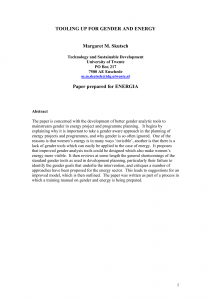
Tooling Up For Gender and Energy
The paper is concerned with the development of better gender analytic tools to mainstream gender in energy project and programme planning. It begins by explaining why it is important to take a gender aware approach in the planning of energy projects and programmes, and why gender is so often ignored. It proposes that improved gender…
-
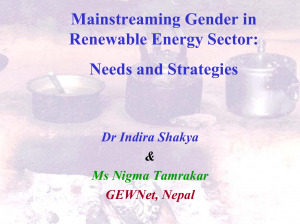
Mainstreaming Gender in Renewable Energy Sector
This presentation sets out to address the question why gender issues are important in the context of energy. It continues to argue that women need a meaningful participation in energy initiatives and explains what this means. Constraints to achieving meaningful participation are stated and policy needs and strategies are listed.
-
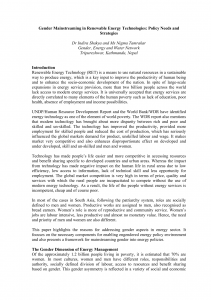
Mainstreaming Gender in Renewable Energy Sector
This presentation sets out to address the question why gender issues are important in the context of energy. It continues to argue that women need a meaningful participation in energy initiatives and explains what this means. Constraints to achieving meaningful participation are stated and policy needs and strategies are listed.
-
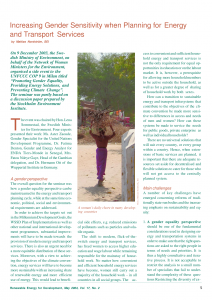
Increasing Gender Sensitivity when Planning for Energy and Transport Services
This is a summary report of a side event to the UNFCCC COP 9 in Milan titled ‘Promoting Gender Equality, Providing Energy Solutions, and Preventing Climate Change’, organised by the Swedish Ministry of Environment, on behalf of the Network of Women Ministers for the Environment. The overall question for the seminar was how a gender…
-
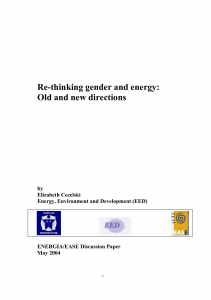
Re-Thinking Gender and Energy: Old and new directions
This paper asks what approaches to policy research could help make the linkages among gender, energy and poverty more understandable and more convincing to policy makers and practitioners, both in the energy sector itself, and in the gender and development community. It attempts a “re-thinking” of the gender and energy paradigm, by looking both backwards…
-
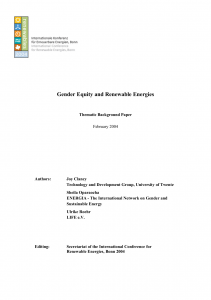
Gender Equity and Renewable Energies
The aim of this paper is to review existing evidence on the role of renewable energies in bringing gender equity. The paper first explores the evolution of thinking on gender and energy. Next, the reasons why gender analysis can help those people trying to increase the dissemination of renewable energy technologies are presented. There is…
-
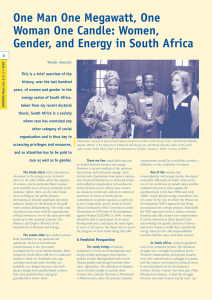
One Man One Megawatt, One Woman One Candle: Women, Gender, and Energy in South Africa
-
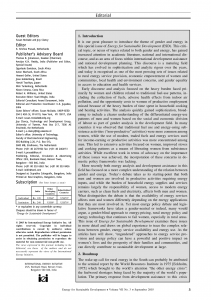
Editorial in special issue Energy for Sustainable Development Journal on Gender and Energy
The articles in this special issue of ‘Energy for Sustainable Development’ show that ‘engendered’ approaches to energy service provision and energy policy can have a powerful and positive impact on women’s lives and the prosperity of their families and communities, and can directly contribute to sustainable development at large.
-
Mainstreaming Gender in Energy
This presentation starts out by explaining why gender is so important in the context of energy. It then continues to ask what a meaningful participation of women in energy initiatives means and what the constraints are in achieving this meaningful participation. It concludes by exploring the possible roles for ENERGIA to play in this field…

